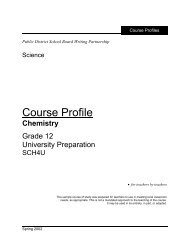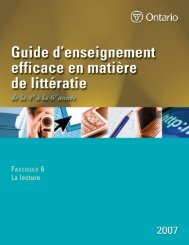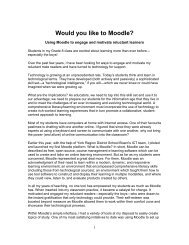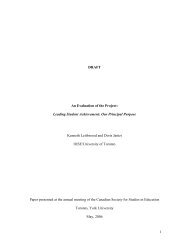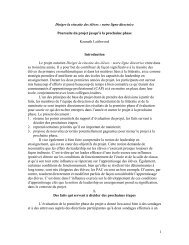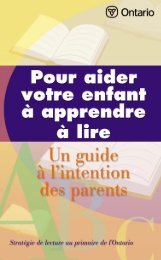a history of curriculum services canada
a history of curriculum services canada
a history of curriculum services canada
Create successful ePaper yourself
Turn your PDF publications into a flip-book with our unique Google optimized e-Paper software.
III. 1994<br />
The Work Group lost no time in moving ahead. The new year brought with it a preliminary<br />
decision to contract with ONTERIS for data entry and an exportable Dbase file.<br />
Staffing was the group’s next initiative. Job descriptions for a "Clearinghouse Co-ordinator"<br />
and an "administrative assistant" were finalized and advertising options discussed. A selection<br />
team was appointed and application forms, advertising copy, advertising venues, and guidelines<br />
for recruiting, interviewing and selecting candidates were proposed.<br />
With a Co-ordinator soon to be hired, the Work Group determined that the time was right to<br />
shift its primary focus to policy making. Its first directives, issued in a February 1 policy<br />
statement, were that “only the best material” should be included in the catalogue and that the<br />
needs <strong>of</strong> all the stakeholders should be addressed.<br />
Meanwhile, OPSBA was chosen as the not-for-pr<strong>of</strong>it project "banker" to receive transfer<br />
payments from the Ministry and to administer the project's funds under the direction <strong>of</strong> the<br />
Work Group. Peter Brown, <strong>of</strong> Corporate Services and Accounts, was invited to address the<br />
Work Group on the Ministry’s position. He advised that MET would try to keep the project in a<br />
positive cash flow position, that accountability mechanisms were key, and that the project<br />
should request its funds in phases, as needed. If they believed their work should extend into the<br />
future, a business plan would be required before current funding ran out. It should include<br />
potential cost savings to boards and strategies to address long-term costs. He also stressed the<br />
need to keep the Ministry fully informed about the progress <strong>of</strong> the project at all times.<br />
With February came good news. The Toronto Board <strong>of</strong> Education was interested in listing its<br />
materials in the catalogue. The clearinghouse had its first indication <strong>of</strong> potential buy-in! The<br />
Work Group now began in earnest to address the logistics <strong>of</strong> soliciting, receiving, and<br />
processing materials.<br />
Further consideration was given to how publishers might become involved with the<br />
clearinghouse. However, in March 1994, the Canadian Book Publishers' Council - School<br />
Group formalized its opposition to the project. While the Council supported sharing "best<br />
practice" teaching strategies among boards, it felt that the clearinghouse was redundant.<br />
ONTERIS already had a database <strong>of</strong> materials, some <strong>of</strong> which were published, together with the<br />
C-14 list, on OTF's Electronic Village, which served the entire province. In addition, the<br />
Council reiterated its concern about the circumvention <strong>of</strong> the C-14 process and the potential for<br />
copyright infringement.<br />
On March 24, while this situation was developing, the selection/interview team recommended to<br />
the newly dubbed "Ontario Curriculum Clearinghouse" (OCC) Work Group that Susan Langley<br />
be appointed as Co-ordinator (seconded from the Peel Board), effective 15 April 1994 to 30<br />
June 1995. A press release would announce her acceptance. At the same meeting, the Policies<br />
©2008 Curriculum Services Canada 9



